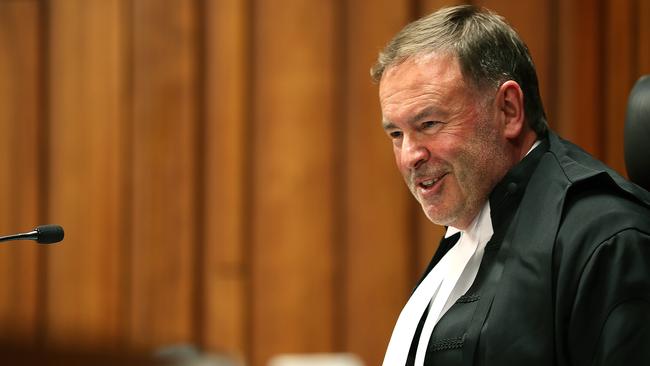Judge Gregory Geason flags High Court challenge against suspension
Tasmania faces a Constitutional standoff, with accused judge Gregory Geason warning MPs he will take High Court action to prevent them suspending him.

Tasmania faces a high-stakes constitutional standoff, with judge Gregory Geason warning MPs that he will take High Court action to prevent them from suspending him.
Justice Geason has pleaded not guilty to one charge of assault and one of emotional abuse and on Tuesday state parliament is due to consider a motion calling on the governor to suspend him.
However, lawyers for Justice Geason have obtained a legal option from two SCs suggesting the state legislative power under which parliament would suspend him is not constitutional.
On Sunday night, they wrote to the Speaker of the Assembly and president of the Legislative Council providing the opinion and foreshadowing High Court proceedings, should the motion proceed.
“Senior counsel concur that provision in the Supreme Court (Judges’ Independence) Act 1857 upon which the course presently intended to be adopted … is predicated is, in fact, constitutionally invalid to the extent that it purports to authorise suspension,” lawyer Fabiano Cangelosi has told MPs.
“It follows that any address to the governor of Tasmania relying upon that provision (to suspend Justice Gleason) is similarly invalid, and should not be pursued.
“Should the honourable members proceed notwithstanding the opinion of senior counsel, proceedings seeking declaration of the invalidity are likely.”
Several senior lawyers question the move to suspend Justice Geason, given he has pleaded not guilty and is not hearing cases; others believe the action is reasonable.
Justice Geason, 62, has through his legal team argued he is already effectively suspended.
The judge on Sunday night sent MPs a written, signed undertaking to reassure them he would not exercise his powers as a judge until the criminal proceedings against him were concluded.
Section One of the Supreme Court (Judges’ Independence) Act provides that both houses of state parliament can petition the governor to suspend or remove a judge.
However, in an opinion provided to MPs, silks Grant Donaldson, a former West Australian solicitor-general, and Greg Barns, of Tasmania, argue that the section does not “expressly empower” the parliament to remove or suspend a judge.
“The act merely provides that any purported suspension or removal is unlawful unless preceded by an address of both houses of parliament,” their opinion says.
The opinion says it appears a British colonial law allowing removal of judges after findings of misbehaviour remains in operation in Tasmania but this did not allow for suspension, only dismissal.
It cites High Court precedent that superior courts such as Tasmania’s Supreme Court, because they can exercise federal judicial power, cannot be “inappropriately dependent on the legislature or executive of the (state) in a way incompatible with requirements of independence and impartiality”.
“In our opinion, because the effect of section one … is that justices of the Supreme Court of Tasmania can be suspended by the governor merely upon address of both houses of parliament, where no reason for suspension need exist, the section is invalid,” the silks conclude.
Attorney-General Guy Barnett has defended a suspension motion as justified, given the serious charges facing Justice Geason.
He and Chief Justice Alan Blow have refused to respond to revelations in The Australian last week that after speaking to Mr Barnett, the Chief Justice suggested to Justice Geason his resignation was “one option” before the parliamentary process “goes further”.
Justice Geason denies all the allegations against him.







